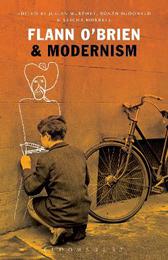
|
Flann O'Brien & Modernism
Paperback / softback
Main Details
Description
Flann O'Brien & Modernism brings a much-needed refreshment to the state of scholarship on this increasingly recognised but still widely misunderstood 'second generation' modernist. Rather than construe him as a postmodernist, it correctly locates O'Brien's work as the product of a late modernist sensibility and cultural context. Similarly, while there should be no doubt of his Irishness, and his profound debts to Irish language, history and culture, this collection seeks to understand O'Brien's nationally sensitive achievement as the work of an internationalist whose preoccupations reflect global modernist trends. The distinct themes and concerns tracked in Flann O'Brien & Modernism include characterization in branching narrative forms; the ethics and paradoxes of naming; parody and homage; lies and deception; theatricality; sexuality; technology and transport; and the inevitable matter of drink and intoxication. Taken together, these specific topics construct a mosaic image of O'Brien as an exemplary modernist auteur, abreast of all the most salient philosophical and technical concerns affecting literary production in the period immediately before and after World War Two.
Author Biography
Julian Murphet is Professor of Modern Film and Literature at the University of New South Wales, Australia. He is the author of Multimedia Modernism (2009), Literature and Race in Los Angeles (2001), co-author of Narrative and Media (2005), and co-editor of Literature and Visual Technologies (2003). Ronan McDonald holds the Australian Ireland Fund Chair in Modern Irish Studies and is Director of the Global Irish Studies Centre at the University of New South Wales, Australia. His recent publications include Tragedy and Irish Literature: Synge, O'Casey, Beckett (2002), The Cambridge Introduction to Samuel Beckett (2006), and a special issue of the Yearbook of English Studies (2005) on 'Irish Writing since 1950'. Sascha Morrell is Lecturer in English Literature at the University of New England, Australia. She studied at the University of Cambridge and has broad interests in 19th and early-20th Century American, British and 'Antipodean' literatures.
ReviewsThe essays in the collection do a good job of showing how O'Brien's work should be read within the context of trans-European modernism. * Times Literary Supplement (reviewed by Jon Day) * Flann O'Brien often denounced modernism but with a vehemence that was a kind of homage. This collection of essays, in exploring that uneasy but deep relationship, offers a wholly new perspective on his writings and one which goes well beyond the fall-back of treating them as a project on the fringes of Irish literature. In a sequence of deft, original, sometimes astounding studies, the authors take O'Brien's work as a test-case of the modern world. In their analyses, they go well beyond all narrowing models of Irish Studies and at the same time challenge and complicate many received paradigms of modernism. The result is an audacious and satisfying book. More than a collection of random essays on an eccentric, this volume suggests that the eccentric may simply be the person with a deeper than average understanding of what passes as normality. It is a major addition to the developing debate about Flann O'Brien. -- Declan Kiberd, Donald and Marilyn Keough Professor of Irish Studies, University of Notre Dame, USA Some day in a civilized world there will be a Comic's Corner in the Cathedral of Great Literature and Flann O'Brien will occupy an honourable place there. He remains for now an enigmatic figure, enjoying cult rather than canonical status, and possessed of so many variable and unstable identities as to be finally elusive. Elegantly introduced and intelligently developed, this study delivers many sharp and timely critical takes on O'Brien's evolving narrative styles and fixed obsessions. The writer that emerges here is an internationally-minded late modernist vertiginously distracted and delighted in the maze (without exit) of Irish fiction and the fictions of Irishness. -- Joe Cleary, Professor of English, National University of Ireland, Maynooth, Ireland Reluctant modernist' or 'devilish apostate': this collection powerfully and decisively reassesses the relationship of Flann O'Brien to literary modernism. It marks a particularly significant contribution in refusing the binaries that can constrict an appreciation of O'Brien, who now rightly emerges as Irish and European, local and international, journalist and novelist. Most welcome of all, it reminds its readers of the recalcitrant, the comic, the gleeful, the subversive--and all that makes Flann O'Brien worth reading. -- Margaret Kelleher, Chair of Anglo-Irish Literature and Drama, University College Dublin, Ireland Through a series of well-considered interventions, the essays collected here succeed both in advancing the Irish modernist goal "to reveal not only the importance of modernism to Ireland, but also of Ireland to modernism" and in demonstrating the untapped potential of O'Nolan's mercurial, multi-genre writing for the future of new modernist inquiry. ... The strong case that O'Nolan's unruly art recasts modernism's vestiges amid shifts in the field makes this collection highly recommended not only to O'Nolan scholars but also to those with a broader interest in Irish and (new) modernist studies. Indeed, liberated from calcified myths, O'Nolan's work emerges as an important coordinate against which to reconsider commonplaces about Joyce's own place in the modernist canon. * James Joyce Quarterly *
|